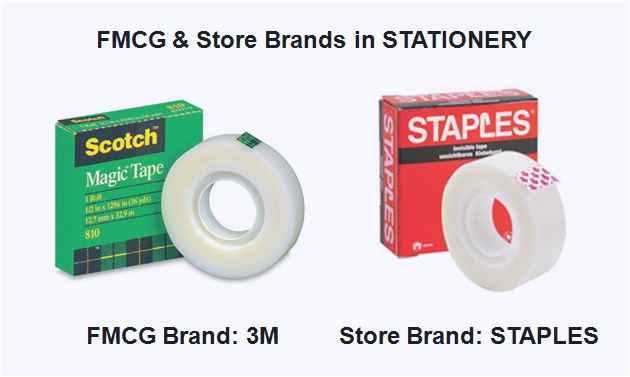According to a recent report, FMCG companies have started manufacturing store brands for leading retailers in India and elsewhere.
As I’ve written in the past, store brands – also called house brands or retail private labels – are a powerful weapon in the armor of organized retailers to compete with kirana stores (India’s version of mom-and-pop stores) that control more than 85% of the Indian market for retail goods. Store brands are common in milk, juice, eggs, medicine, soaps, lentils, stationery, apparel and other fast moving items. They’re traditionally – but no longer necessarily – packed in plain boxes or bags and bear nondescript brand names owned by retail companies if not the name of the retailer itself. Since retailers incur little or no advertising costs for selling store brands, they can afford to price them significantly lower than leading FMCG brands, even at a comparable quality.
 Now, if a store brand delivers the same quality as an FMCG brand at a lower price, it’s sure to take market share away from the latter. As a result, store brands have traditionally been viewed as rivals to FMCG brands. By manufacturing store brands, FMCG companies seem to be consorting with their traditional enemies. It would be interesting to understand their undelying motive for doing so. Is it, as the official line goes, to keep out other players and fuel upsell of their own brands in other stores? Or, are there deeper factors at play?
Now, if a store brand delivers the same quality as an FMCG brand at a lower price, it’s sure to take market share away from the latter. As a result, store brands have traditionally been viewed as rivals to FMCG brands. By manufacturing store brands, FMCG companies seem to be consorting with their traditional enemies. It would be interesting to understand their undelying motive for doing so. Is it, as the official line goes, to keep out other players and fuel upsell of their own brands in other stores? Or, are there deeper factors at play?
 During the recent recession, as in the previous ones, consumers reportedly switched to value brands. This would’ve resulted in store brands gaining market share at the cost of FMCG brands and in under utilization of production capacities at FMCG companies. Unlike in the previous recessions, according to this recent McKinsey report, consumers are not likely to return to their free spending days even when the economy recovers. Which means that FMCG manufacturers’ return to full production capacity is a long way off. This realization could’ve triggered the move by FMCG companies to start manufacturing store brands for their traditional rivals as a stop-gap measure to improve their capacity utilization, even if it meant adoping the “if you can’t beat them, join ’em” policy.
During the recent recession, as in the previous ones, consumers reportedly switched to value brands. This would’ve resulted in store brands gaining market share at the cost of FMCG brands and in under utilization of production capacities at FMCG companies. Unlike in the previous recessions, according to this recent McKinsey report, consumers are not likely to return to their free spending days even when the economy recovers. Which means that FMCG manufacturers’ return to full production capacity is a long way off. This realization could’ve triggered the move by FMCG companies to start manufacturing store brands for their traditional rivals as a stop-gap measure to improve their capacity utilization, even if it meant adoping the “if you can’t beat them, join ’em” policy.

The policy is good for products users,
FMCG sets a good example.